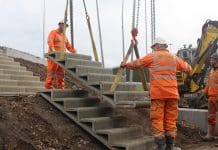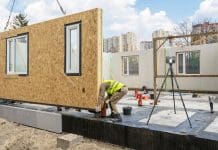We hear from Tim Reid, Customer Relationship Director, NHBC (National House Building Council) on de-risking MMC and driving residential innovation
There has been no shortage of discussion around the use of MMC, yet certain quarters, particularly investors and funders, require more convincing of its viability. Despite its many merits, residential schemes built using MMC are still considered higher risk than their counterparts, which has prevented higher take-up of new, more innovative ways to build the homes we need to tackle the housing crisis.
Benefits & risks of MMC
The potential benefits of MMC are wide-ranging – including faster build times, less disruption on site, carbon reduction and often much-improved energy performance – and are easily demonstrated and seen first-hand in countless successful developments across the country. However, the reality is that MMC isn’t without risk – and, while we know that it is key in tackling the housing crisis, progress has been sluggish.
While some developers are well-versed on the use of new, innovative techniques to deliver residential schemes, and with the financial backing enabling them to push ahead, others remain more reticent and may struggle to secure the buy-in of stakeholders and investors. In answer to that, more momentum must come from the top. It was positive to see MMC included within the Affordable Homes Programme, with strategic partners mandated to include 25% MMC within each bid, but the industry must go further to take MMC mainstream, with government policy supporting the shift.
Convincing investors of the long-term viability of MMC schemes is a major piece of the puzzle – and doing so could release a significant volume of capital for innovative new residential projects across the country, from BTR and social housing through to student accommodation and retirement living.
A recent report from Deepki revealed that 73% of UK institutional real estate investors expect more firms to walk away from commercial real estate with poor ESG performance – while commercial property has a job to do, it opens-up a major opportunity for the residential sector.
Investors must have confidence that a development will stand the test of time; it must not only be safe and high-quality, but desirable to occupiers to deliver an assured income stream.
When it comes to the development process, there are often questions around the robustness of factory controls and processes, and whether those on site have the right skills to install MMC systems and ensure that designs become reality with the right safeguards in place. The site itself can also often pose unique challenges, along with the use of materials.
Approval process
However, while it’s important to be alive to the potential obstacles, we do now have the necessary checks and balances in place for de-risking MMC residential schemes.
While MMC systems are not all created equal, and there will still be projects that are not suited to MMC for various reasons, trusted accreditation schemes like NHBC Accepts provides all-important confidence that will see more MMC schemes coming forward. Asking the difficult questions up front means that new systems and products can be fast-tracked on site, giving developers, contractors and investors the confidence that quality, design and assembly has already been reviewed.
Manufacturers undergo a high degree of scrutiny, with systems considered thoroughly in advance of a project starting on site, visits to the factory and regular in-depth reviews, with a range of factors considered during the process, including design, performance, durability and price. Developers now have a library of NHBC approved systems that have gone through rigorous assessments to secure the accreditation, making the selection process and necessary due diligence much more straightforward.
The recent launch of new trade body, Make Modular, is also fantastic news for the progress of MMC and, backed by the likes of Legal and General, TDR Capital and Goldman Sachs, it’s a sign that we’re rounding a corner on the acceptance of new, more innovative ways to build the homes we need.
While it’s certainly true that the implications of getting MMC wrong are potentially greater, the risks can be addressed and effectively managed.

















